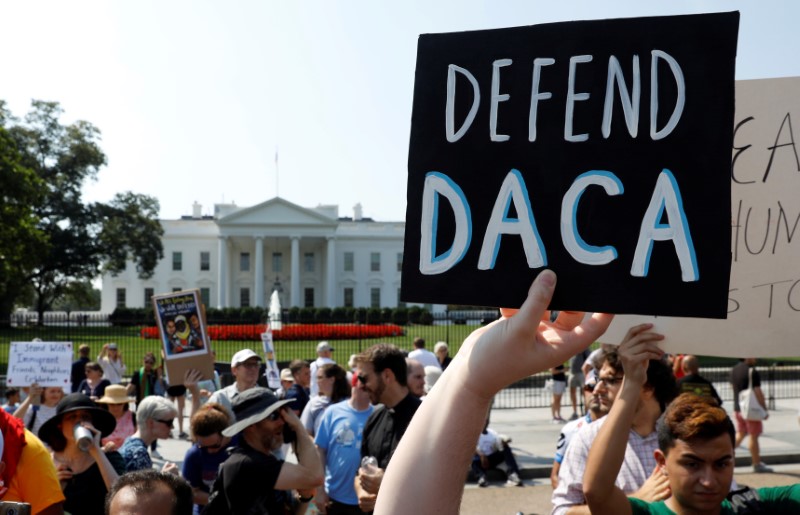Investing.com’s stocks of the week
By Richard Cowan
WASHINGTON (Reuters) - A bipartisan push in the Senate to protect undocumented people who immigrated to the United States as children is gaining momentum as lawmakers try to wrap up negotiations, Republican Senator Jeff Flake said on Tuesday.
Both Republican and Democratic senators said a deal would include measures to improve border security, something which Republicans have repeatedly stressed is a priority and which Democrats have said they would meet as part of a deal.
President Donald Trump said in September he was terminating the Deferred Action for Childhood Arrivals (DACA) program, and he challenged Congress to come up with legislation to protect around 700,000 "Dreamers" from the threat of deportation. Trump's Democratic predecessor, President Barack Obama, created DACA by executive order.
"We're still working ... we're very close" to an agreement, Flake, one of a few Republicans and Democrats in the Republican-controlled Senate leading the effort, told reporters.
Senate Democratic leader Chuck Schumer, speaking on the Senate floor on Tuesday said, "We are in the process of negotiating with Republicans to provide a significant investment in border security in exchange for DACA. These talks continue to progress, and I’m hopeful we can reach an agreement."
Trump said the current program will be terminated in March, but already some participants have seen their enrollments expire.
Trump's tone toward Dreamers has varied. While he has vowed "a great love" for these youths, on Saturday he referred to them as "criminal aliens." The president would have to sign off on legislation before it could become law.
Democrats in Congress have been pushing to attach legislation restoring the immigration program to a must-pass spending bill either later this month or sometime next month.
Another Republican active in the effort, Senator Thom Tillis, also was upbeat.
"When we sit down and talk (with bipartisan groups of senators) we see that we're not that far apart," Tillis said in a brief interview on Monday night.
But Tillis said additional law enforcement efforts in the interior of the country - and not just at the border - must be part of any deal.
Many Democrats have said they would support increased southwestern border enforcement efforts such as more electronic and drone surveillance. But at least publicly they have not embraced some of the enforcement steps for the country's interior that Republicans seek.
Negotiations, which have been closely held as senators engaged in high-profile fights over revamping the U.S. tax code and funding federal programs in order to avert government shutdowns, had been slow-going.
There have been differences over how many Dreamers would be covered by legislation, the length of temporary protections from deportation and whether Dreamers would eventually qualify for permanent residence and citizenship.
These decisions have been complicated by Republicans' immigration enforcement demands.
Any deal negotiated by No. 2 Senate Democrat Dick Durbin - a lead negotiator for Democrats and who along with Republican Lindsey Graham introduced the Senate bill that is the focal point - and his fellow senators would still have to be sold to the full Senate. Durbin has been pushing to help Dreamers for the past 16 years.
Legislation would face an even tougher struggle in the House of Representatives from a core of hard-line opponents to granting "amnesty" to anyone who arrived illegally, even children brought by their parents.
Immigration advocacy groups were heartened by a letter sent on Dec. 5 by 34 House Republicans urging the passage of legislation by year's end.
A broad coalition, including the U.S. business community and evangelicals, have joined forces to pass legislation.
Neil Bradley, a senior vice president at the U.S. Chamber of Commerce, said failure "would have a negative impact on the economy and our community," and that for the hundreds of thousands of Dreamers who have work authorizations under DACA it would "literally rip them out of the work place."
